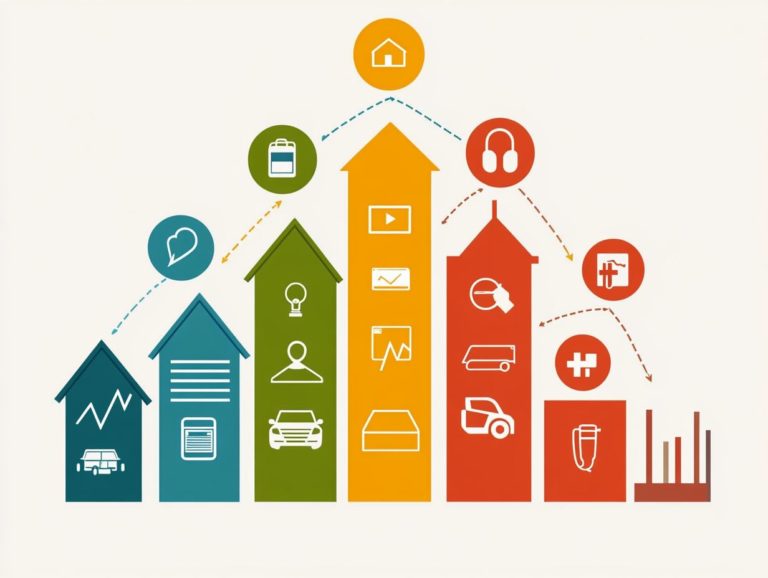What Is the Average Cost of Auto Insurance?
Navigating the world of auto insurance can feel overwhelming, especially with so many factors influencing your costs and coverage options.
This article breaks down everything you need to know about auto insurance, from understanding what affects your premiums to comparing various types of coverage such as liability, collision, and comprehensive.
You ll explore how to calculate the average cost of insurance and discover effective strategies to lower your expenses. There are also tips on selecting the right plan tailored specifically to your needs.
Whether you re a seasoned driver or a new car owner, this guide has you covered.
Contents
Key Takeaways:

- The average cost of auto insurance is influenced by factors like age, driving record, and location.
- Liability, collision, and comprehensive coverage are the three main types of auto insurance, each with its benefits and costs.
- To determine the average cost, providers consider the type of coverage, deductible, and available discounts.
Understanding Auto Insurance Costs
Grasping the nuances of auto insurance costs is vital for drivers across the United States, as it profoundly influences financial planning and enhances the overall driving experience.
Factors like the average cost of car insurance, the type of coverage required whether minimum or full coverage and your driving record can significantly impact the premiums offered by various insurance companies.
Recognizing how insurance discounts and state-specific regulations shape auto insurance rates is essential for any driver looking to secure the best coverage tailored to their needs.
Factors Affecting Insurance Premiums
Several critical factors influence your insurance premiums, determining how much you pay for auto insurance each year. Everything from your driving record to the type of vehicle you drive plays a role in this equation.
These factors shape your coverage costs. They can vary widely from person to person. For instance, a history of accidents or traffic violations may lead insurers to view you as a higher risk, resulting in elevated premiums. The type of vehicle you choose also weighs heavily in calculations; more expensive cars or those prone to theft typically come with higher insurance costs.
Your credit score increasingly influences providers. A poor credit history might indicate a tendency toward risky behavior, which could lead to higher premium rates. These variables together create a comprehensive picture of the financial responsibilities you face when securing your auto insurance.
Types of Auto Insurance Coverage
Understanding the various types of coverage available is essential for making an informed decision that suits your financial landscape and driving requirements.
You have several options available, including liability insurance, collision coverage, and comprehensive coverage. Each type serves a distinct purpose and offers varying degrees of protection.
By understanding the differences between these coverage types, you can customize your insurance plan to reflect your driving experience and the unique risks associated with your vehicle.
Comparing Liability, Collision, and Comprehensive Coverage

To make an informed choice about your insurance, understand the differences between liability, collision, and comprehensive coverage. Each type serves a specific purpose.
Liability coverage is essential. It covers damages or injuries if you’re at fault in an accident, protecting you from major financial loss.
Collision coverage helps when your car is damaged in a crash, no matter who is at fault. It’s especially useful for newer or expensive vehicles.
Comprehensive coverage protects against incidents like theft, vandalism, or natural disasters. This is crucial if you live in areas prone to severe weather.
Knowing these types helps you choose the right coverage for your driving needs.
Calculating the Average Cost of Auto Insurance
Calculating the average cost of auto insurance involves various factors. These include state minimum requirements and your personal driving profile.
Looking into national car insurance rates reveals insights into the typical premiums across different states.
Factors Used in Determining Average Cost
Several factors determine the average cost of auto insurance. These include your vehicle type, driving experience, credit score, and accident history.
Your vehicle choice greatly impacts your premiums. Sports cars usually have higher rates due to the risk they pose.
Driving habits matter too. Frequent hard braking or rapid acceleration can increase your rates.
A good credit score often leads to lower rates, while a history of claims might categorize you as a higher risk.
These elements together influence your insurance rates.
Ways to Lower Your Auto Insurance Costs
Want to save on auto insurance? Here s how! You can lower your auto insurance costs with smart strategies. Take advantage of discounts for safe driving habits and responsible vehicle ownership.
This can lead to significant savings on your premiums!
Discounts and Strategies for Savings

Various discounts can help reduce your auto insurance rates. Understanding these can lead to substantial savings over time.
Many insurance companies offer discounts for bundling policies, like home or renters coverage.
A clean driving record opens doors to safe driver discounts, benefiting you and promoting safer roads.
If you have advanced safety features in your vehicle, you might qualify for additional discounts.
To maximize savings, compare quotes from different providers and ask about potential discounts!
How to Choose the Right Auto Insurance Plan
Choosing the right auto insurance plan demands careful attention to various factors, including your specific insurance needs, how you drive, and budget constraints. It s essential that your coverage aligns seamlessly with what you require.
Begin by comparing quotes from various insurers. Dive deep into the specifics of each policy and uncover any available discounts. This comprehensive approach enables you to make an informed decision.
A thorough analysis of your insurance options will lead you to the best car insurance, providing sufficient coverage while keeping your finances intact.
Factors to Consider When Selecting Coverage
When choosing the right auto insurance coverage, consider how you use your vehicle, your driving record, and the specific insurance requirements of your state.
Understanding how often you use your vehicle whether for commuting, leisurely drives, or business is crucial, as each scenario impacts the type of coverage you need. A solid driving record reflects responsible behavior behind the wheel, often leading to lower premiums and better policy options.
Every state has its own insurance rules, which set minimum coverage levels and liability limits. Evaluating these aspects ensures you have comprehensive protection tailored to your unique needs.
Frequently Asked Questions
What factors affect the average cost of auto insurance?
The average cost of auto insurance varies depending on your age, location, driving record, and the type of car you insure. Younger drivers, people with poor driving records, and those in high-accident areas typically pay higher premiums.
How can I lower my auto insurance costs?
To lower your auto insurance costs, consider the following:
- Maintain a good driving record
- Choose a car with safety features
- Bundle your insurance policies
- Ask about discounts for being a good student or having a clean driving record
How does the type of car I drive affect insurance costs?
The type of car you drive can significantly impact your insurance costs. Cars that are expensive to repair or more likely to be stolen usually have higher premiums. Conversely, cars with good safety records may qualify for discounts.
Do all insurance companies offer the same rates for auto insurance?
No, the average cost of auto insurance can vary significantly among companies. Shop around and compare quotes to ensure you get the best rate for the needed coverage.
What other factors should I consider when choosing auto insurance?
Besides cost, consider the coverage options and customer service of an insurance company. A lower average cost doesn t always mean better coverage or service. Aim to balance cost and quality when selecting auto insurance.
Start your journey to affordable auto insurance today!






